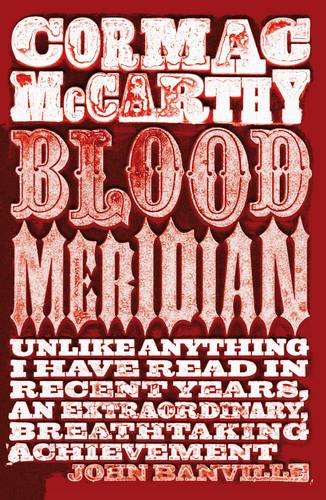 Each page is a death warrant, its cover an autopsy table splattered with the remains of the depraved characters within. In Blood Meridian, Cormac McCarthy drains the romance right out of the wild west and replaces it with an embalming fluid of heartlessness.
Each page is a death warrant, its cover an autopsy table splattered with the remains of the depraved characters within. In Blood Meridian, Cormac McCarthy drains the romance right out of the wild west and replaces it with an embalming fluid of heartlessness.
At first, I found this book to be a runaway horse. I wanted desperately to enjoy the ride, but my hands kept slipping from the bloodslick mane. It took me awhile to find a place to grab tight. I grew sore sitting on a bareback of rampant violence. I was nearly thrown by the bouncing hooves of McCarthy’s selfbranded style. Finally, as it always is with this writer, I reached for the characters.
The kid. The expriest. The judge. You know them through their acts, not their names. The kid is, I suppose, the closest thing we have to a protagonist. He is not as wanton as the others, although he most certainly participates in the feeding frenzy that stampedes across each page. You are provided a wide open menu to select the most bloodthirsty of the gang. There is ample evidence to support at least a dozen candidates. A necklace made of human ears. Infant blood splayed against a rock. The sudden unprovoked murder of an innocent old woman. Puppies dispatched into a churning stream.
By far, the most intriguing of these characters is the judge. Part philosopher, part savage, the judge is void of hair and a conscious. His thirst for blood allows him to use his own urine as a weapon. I see parallels between this character and McCarthy’s Anton Chigurh from No Country for Old Men. Both attempt to justify their barbarity with morbid principles. The difference is that while Chigurh is mechanical and grim, the judge dances naked and joyful atop his beheaded victims. He has a spirit, however twisted. He is a ghost, a metaphor. Like Chigurh, he is endless.
Critics of this book claim McCarthy could have easily made his case for the darkhearted west without spilling so much blood. While I will concede Blood Meridian could have survived with a few less indian scalps, I welcomed the invitation to linger in the disturbing recesses of McCarthy’s brain. This man knows how to shock us. Whether he’s firing at us with a cattle gun in No Country for Old Men, or seducing a corpse in Child of God, I find the depravity to be captivating. Blood Meridian claims to be an historically accurate account of efforts to eliminate Native Americans from the southwestern United States. You pray that McCarthy got his facts wrong, or that his enthusiasm carried him to extreme hyperbole. Damn us all if we were ever that ruthless.
There were times when McCarthy tapped into his inner Faulkner, and here he allowed my mind to wander. Although never as cryptic as Faulkner, McCarthy can certainly numb you with a detailed examination of every roostpot and dusty abuelo west of the Mississippi. It’s easy to get lost. And he invents words. I’m convinced of it. Either that, or he has a vocabulary that simply splits me right down to the thrapple.
Many consider this McCarthy’s masterpiece. To say that Blood Meridian is not my favorite of his works is not a criticism; it is instead proof that he has produced many a masterpiece. Rising to the top of that summit is as difficult as surviving the barbaric west.